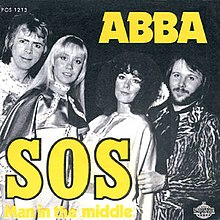SOS (ABBA song)
| "SOS" | ||||||||
|---|---|---|---|---|---|---|---|---|
 |
||||||||
| Single by ABBA | ||||||||
| from the album ABBA | ||||||||
| B-side | "Man in the Middle" | |||||||
| Released | June 1975 (Sweden) 8 September 1975 (US) 20 September 1975 (UK) |
|||||||
| Format | 7" single | |||||||
| Genre | Pop | |||||||
| Length | 3:22 | |||||||
| Label |
Polar (Sweden) Epic (UK) Atlantic (US) Mushroom/Warner Bros. (Oceania) |
|||||||
| Writer(s) |
Björn Ulvaeus Benny Andersson Stig Anderson |
|||||||
| Producer(s) | Björn Ulvaeus Benny Andersson |
|||||||
| ABBA singles chronology | ||||||||
|
||||||||
|
||||||||
| "SOS" | ||||
|---|---|---|---|---|
 |
||||
| Single by Agnetha Fältskog | ||||
| from the album Elva kvinnor i ett hus | ||||
| Released | November 1975 | |||
| Format | 7" single | |||
| Recorded | 1975 | |||
| Genre | Europop, Pop | |||
| Length | 3:35 | |||
| Label | CBS Cupol | |||
| Producer(s) |
Benny Andersson Björn Ulvaeus Agnetha Fältskog |
|||
| Agnetha Fältskog singles chronology | ||||
|
||||
"SOS" was the third single from Swedish pop group ABBA's self-titled 1975 album, their third for Polar Music and their second for Epic and Atlantic. It was released with "Man in the Middle" as the B-side. Agnetha Fältskog, who sang lead, recorded the song in Swedish on her 1975 solo album Elva kvinnor i ett hus. "SOS" was ABBA's first major worldwide hit since "Waterloo".
"SOS" (working title; "Turn Me On") was written by Benny Andersson, Björn Ulvaeus and Stig Anderson and was recorded at Glen Studio on 22–23 August 1974. The title itself was coined by Stig, though the lyrics he provided were re-written by Ulvaeus. "SOS" was among the first of three songs recorded for the group's 1975 album, ABBA.
The song is unique among pop songs of the period, opening with unaccompanied classical keyboard in a subdued D-minor key. Unlike most ABBA tracks that preceded it, the vocal begins with an emotional solo performance by Fältskog. The descending chords and ominous Minimoog synthesizer melody line of the introduction set the tone for Fältskog’s vocals, sounding almost as if she were breaking down in tears. The song then transitions to a rock chorus in a major key, dominated by a distorted electric guitar and full vocals.
Despite the song's catchiness, it was passed over as the lead single from the album; the track "So Long" was chosen instead. "So Long" was chosen primarily because it had the same uptempo beat as their 1974 hit single, "Waterloo".
Lyricist Ulvaeus has said that, after three years of trying to figure out what style would define them, ABBA found its identity as a pop group with the release of "SOS".
...
Wikipedia
